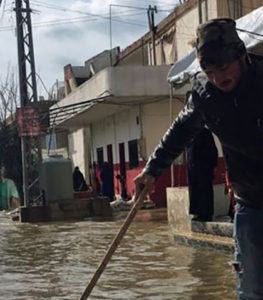Syrian refugees hit by freezing storm
Extreme weather in Lebanon has left thousands of Syrian refugees without shelter and protection, as strong winds, heavy rain and snowfall battered the country last week.
Hundreds of tents and makeshift homes have been blown away.
Storm Norma damaged infrastructure, roads and homes across Lebanon when it hit on January 6 affecting more than 150 informal refugee camps in Akkar and the Bekka Valley.
More than 70,000 refugees, at least half of whom are women and children, are now considered to be at risk as the bad weather is expected to continue.
Aid agencies have described the situation as “dire” with people at risk of freezing.
“The situation is seriously dire. People are freezing, many have lost their already-flimsy homes and are now facing the elements without any kind of protection,” a UNHCR spokesman said.
People are cold, wet and sick and unable to sleep in these conditions, the UNHCR said.
“Many of the people affected have already endured the horror of war, lost their homes and jobs, and now Mother Nature has dealt them a further blow. We are very worried about what will happen in the coming days if the extreme weather continues,” the spokesman said.
Aid agencies are already providing blankets, fuel and food parcels but more is needed.
In the next few days, agencies will install water pumps to help relieve the flooding, repair tents and replace mattresses.
Emergency cash will also be distributed so people can quickly buy what their individual household needs most.
Refugee families have reported a lack of medicine and doctors to combat the sickness that has come with the poor weather.
There are also food shortages.
“Both in the North and the Bekaa, alternative sites have been identified to accommodate families affected by the storm,” the UNHCR said.
About 600 people had been relocated so far and some have moved into permanent structures with family and friends, while others have sought shelter in nearby schools or mosques.
The International Rescue Committee (IRC) has also sent its team to the affected areas and reported severe damage in the camps in North Lebanon.
An IRC spokesperson said that their team visited the camps in the Akkar region and described the site as “looking more like a swimming pool”.
“Irrigation and drainage at informal tented settlements are poor and it is almost impossible to prevent flood water entering the tents,” the IRC said.
IRC has suspended many of its educational activities in the country, affecting 5,700 students.
The Lebanese government has always said it wants the Syrian refugees to return to Syria and in the past has done little to help refugees vulnerable to extreme weather.
However, Prime Minister-designate Saad Hariri has announced measures to mitigate the impact of storms expected over the winter.
The Syrian refugee encampments may continue to be inundated, however. Lebanon does not allow official refugee camps and has strict restrictions on material that can be used to build even semi-permanent structures, to prevent them from becoming permanent.
This has forced many Syrians to live in unprotected tents and brave harsh winters year after year.
The Lebanese government fears the Syrian refugees may never return and will instead stay in Lebanon just as many Palestinian refugees who fled to Lebanon in 1948 did.
On Wednesday, Lebanon’s President Michel Aoun said the Syrian refugees should aim to return to Syria, take part in the Syrian reconstruction and live with “dignity”.
Laurie Nowell
AMES Australia Senior Journalist












